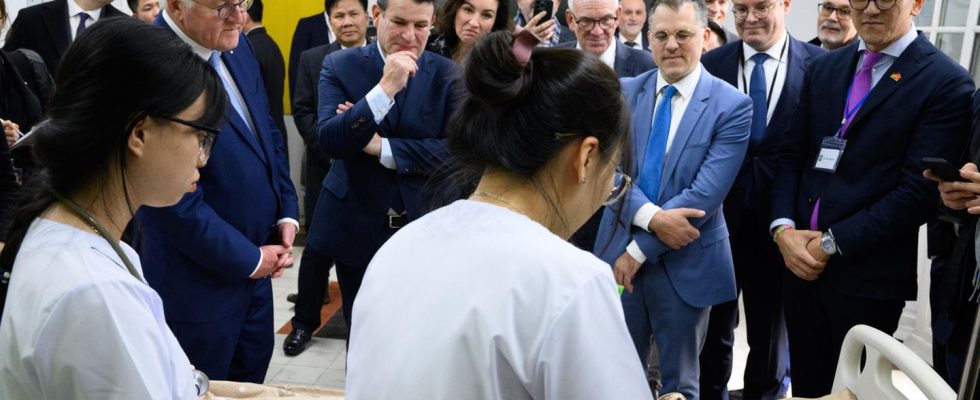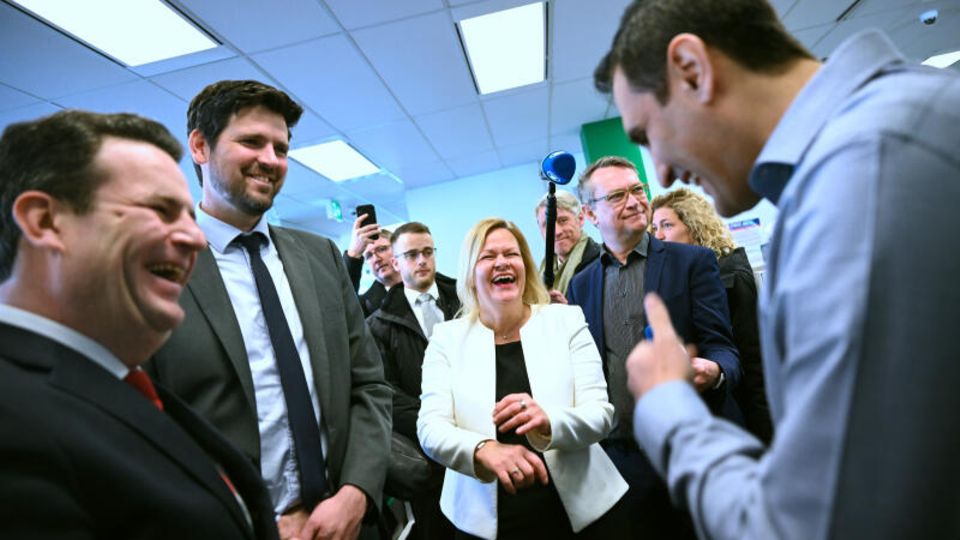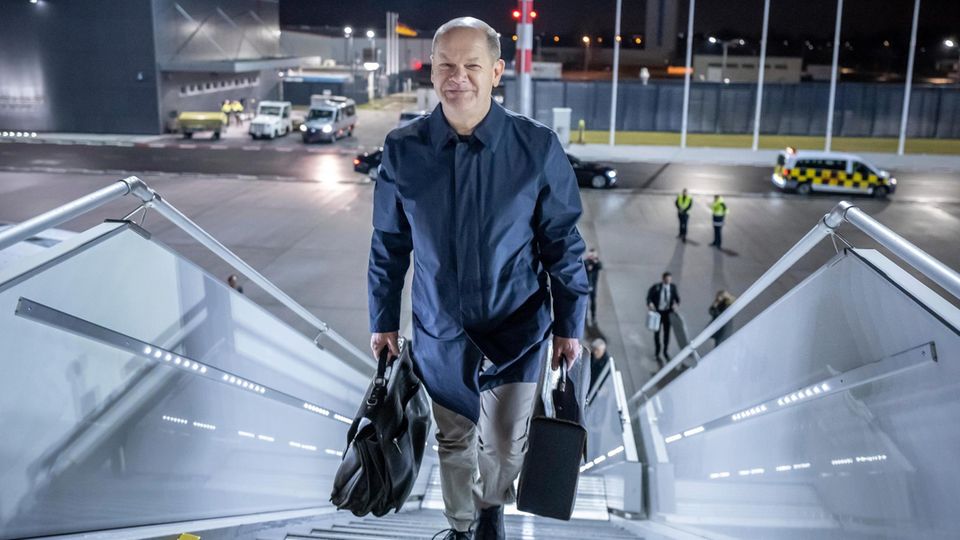On site
Shortage of skilled workers
Steinmeier and Heil in Vietnam: Who would like to come to Germany please, please, please?
After their German course, the two Vietnamese women are now learning the technical terms they need to work as nurses in a German hospital
© Bernd von Jutrczenka / Picture Alliance
Federal President Frank-Walter Steinmeier and Labor Minister Hubertus Heil travel through Vietnam. Ostensibly it’s about recruiting skilled workers. Geopolitical considerations play a role in the background.
“Do you want to sit up or should I put up the headboard?” a young Vietnamese woman asks her classmate, who is lying in bed to simulate a patient. Her teacher asks her to repeat the word “headboard”. Not an easy word if you’ve only been learning German for a year.
Soon Trang will no longer be asking classmates how they like to lie down, but rather seniors in faraway Frankfurt. At the Goethe-Institut Hanoi she is now learning technical language in order to… Germany to work as a nurse. In the teaching room there is a hospital bed, next to it a body with removable organs. And then there is Frank-Walter Steinmeier, not entirely unlike a chief physician.
The Federal President has come, with the German Labor Minister Hubertus Heil at his side. The envoys from Germany want to find out whether they can recruit a few of the Vietnamese skilled workers and perhaps even train them explicitly for the German market.
Around the world looking for workers
You have to say: Once again it’s about that. And again, actually not. The Labor Minister traveled a surprising amount last year, at least considering his position, which actually places him at home. Heil looked for nursing staff in Brazil, opened a migration center in Ghana and had the Canadians explain to him how to become a friendly immigration society.
The labor shortage is one of the biggest problems facing the German economy. Even if geopolitically everything were in perfect order, energy was cheap and inflation was under control, there would be too few people doing work in Germany. This can be improved to some extent by getting more women into full-time jobs, leaving fewer young people without training and getting pensioners to work a little longer. But even then, many energetic people are missing.
So Heil travels around the world and promotes Germany. In Vietnam he benefits from a certain affinity the Vietnamese have for Germany, which is mainly due to the fact that they have relatives and acquaintances there. Many came to what was then the GDR as contract workers in the 1980s, and around 16,000 stayed even after the fall of the Berlin Wall. The so-called boat people, i.e. those who fled communism, streamed into the Federal Republic at around the same time. According to the Federal Statistical Office, a good 200,000 people with a Vietnamese migration history lived in Germany in 2022. So when Hubertus Heil asks in Vietnam why the trainees could imagine Germany, almost all of them say that they have family or friends there.
And in the next step they talk about the hurdles that Germany presents to its immigrants: lengthy visa procedures, complicated language, little chance of having professional qualifications from their home country recognized. Thoughtful salvation. Of course he knows everything, he’s heard it many times.
You can speak to Tran Thi Tuyet Nhu at the Goethe Institute. She took part in a program in which 50 Vietnamese were trained as machining mechanics. Half of them for Vietnamese companies, the other half for German companies. She celebrated her graduation in August and now even has an employment contract. But she is still waiting for her visa today.
Why Vietnam of all places?
Skilled workers, that is one, the obvious reason why the German delegation traveled to Vietnam. The other resonates in the subtone, as was the case during the visits to Ghana, Canada and Brazil: Germany is trying to become more independent of Russia and China. To achieve this, the current federal government travels more than almost any other government before. And even a labor minister is not spared from this. If he can even accompany the Federal President, well, all the better.
Nevertheless, Vietnam is less easy as a partner than Canada. The communist country only knows one party, civil society and freedom of expression are suppressed. Nevertheless, Germany wants to show its presence; Chancellor Olaf Scholz was also in the country in November. You can’t be too picky, there are no perfect partners.
Germany is trying to position itself more broadly and present countries like Vietnam as an alternative to China or Russia. On the one hand, this makes sense because of the migration stories, but also because the economies have long been closely interwoven. According to the Foreign Office, the trade volume between the two countries was around 18 billion euros in 2022.
Yes, it’s complicated.
And things will get even more complicated on Wednesday when Steinmeier flies on to Thailand, where the political regime is not far away and is more authoritarian. According to everything we know, the Federal President will not be looking for workers there.




